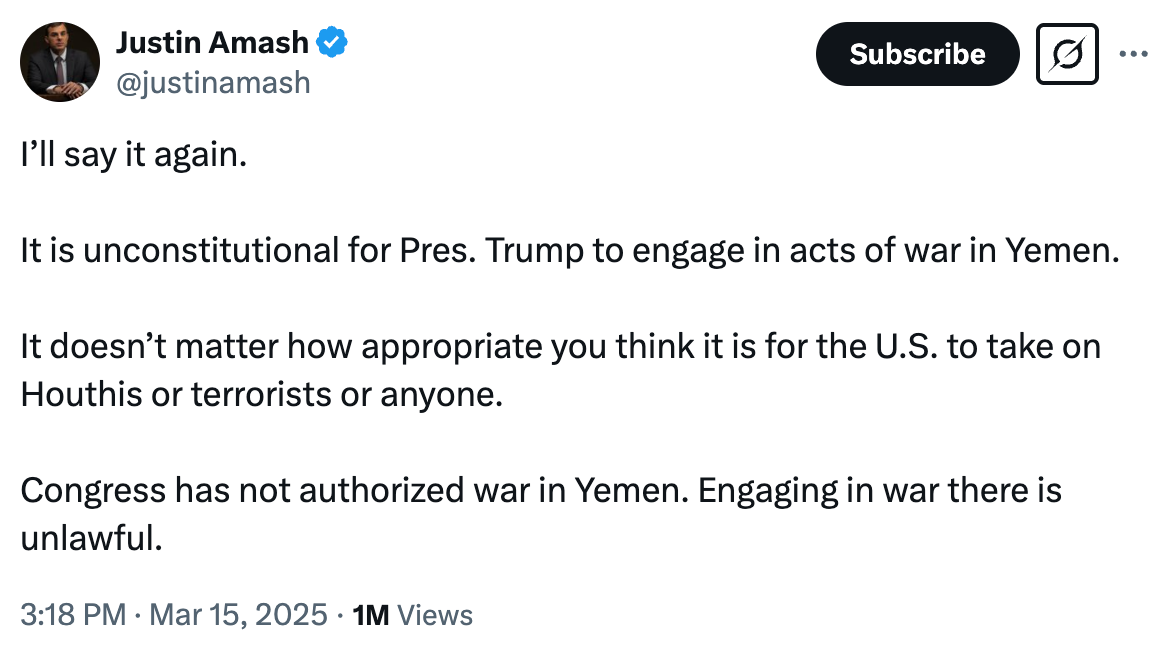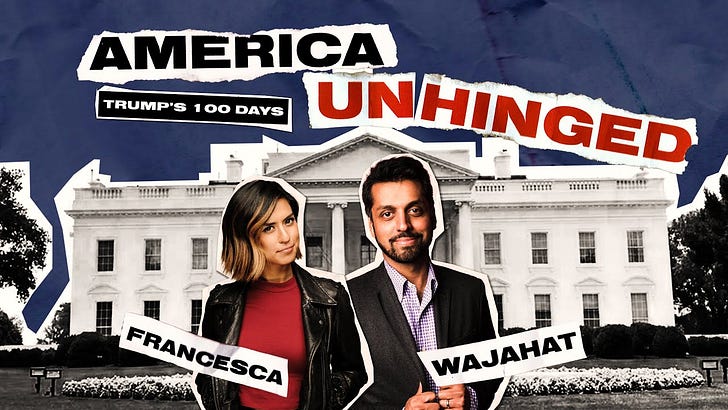Forget the Signal Chat, What About the Yemen War Crimes Revealed in It?
Much of our media is missing the biggest story of all: US officials are not just breaking US and international law but confessing to it in writing.

I get it. It is a big deal. It is a huge story. And I said so myself the day after the stunning revelations from Jeffrey Goldberg broke in The Atlantic.
The fact that the most senior members of the Trump administration, including Secretary of State Marco Rubio, Defense Secretary Pete Hegseth, Vice President JD Vance, and national security adviser Mike Waltz, were discussing classified war plans for Yemen on a publicly available messaging app – Signal! – is a massive breach of national security, a clear violation of federal records laws, and all of those involved – per Hegseth himself in another life – should be “fired on the spot” and “criminally prosecuted.”
So, I completely understand why it continues to dominate news headlines in the US and around the world.
But… what about the contents of that Signal chat? Why does the mainstream media continue to focus only on the rights and wrongs of using a messaging app for sharing war plans, while burying any real discussion about the rights and wrongs of those war plans themselves?
We now know, thanks to a second scoopy Atlantic piece from Goldberg, who bizarrely found himself invited into that Signal group (and, even more bizarrely, then voluntarily exited that group!), that a blatant war crime was committed by the Trump administration in Yemen on March 15.
The principals said so themselves. In the Signal chat. With glee.
Got that? The US government ordered the “collapse” of a residential building because their Houthi target, the “top missile guy,” walked into it to visit his girlfriend. Vance called the bombing “excellent,” CIA Director John Ratcliffe said it was “a good start,” while Waltz reacted with a trio of giddy if childish emojis.
How is it legal, under international humanitarian law, for the US to destroy an entire building filled with civilians to kill one man?
If it is not legal for Israel to do so in Gaza, then how is it legal for the US to do so in Yemen? (Interestingly, Israel reportedly provided the intelligence that the Trump administration relied on for this particular airstrike, and the description offered by Walz in the chat also reminded me of an Israeli AI program in Gaza called “Where’s Daddy?” which was “used specifically to track the targeted individuals and carry out bombings when they had entered their family’s residences.”)
Surely, top US national security officials essentially confessing to a war crime in writing should be a bigger story, no?
And it isn’t just the US prosecution of this war in Yemen that looks, prima facie, illegal. It’s the premise of the war itself.
This is not a war of self-defense. How do we know? Pete Hegseth said so himself. In the Signal chat. With pride.
The defense secretary of the United States is bragging to his fellow Cabinet members that “waiting a few weeks or a month does not fundamentally change the calculus” and “we can easily pause.” “There is nothing time-sensitive driving this timeline,” adds Joe Kent, Donald Trump’s pick for director of the National Counterterrorism Center, in the chat.
So, how is it self-defense? It was US Secretary of State Daniel Webster, during the Caroline Affair of the mid-19th century, who famously defined self-defense under international law as something “instant, overwhelming, leaving no choice of means, and no moment for deliberation.”
Does that sound like what Hegseth or Kent were describing in the chat? Do these officials exchanging compliments and emojis come across as if they’re super-concerned about the immediate safety of US vessels in the Red Sea? Do they sound like they believe US personnel are at imminent risk of attack from the Houthis?
“Based on that Signal chat,” noted Rep. Thomas Massie, a rare anti-war Republican, the Trump administration “had time to come to Congress, but they chose not to.” Massie told reporter Kelley Vlahos this week that “a lot of people have missed the point of the leaked signal chat. I think people are going to debate, and are debating, was that the right forum? Should they [have] been engaged in that channel? Was it reckless? Because they included a reporter, etcetera, etcetera, but they should be looking at what was said. And one thing that was said is that there's no urgency here, okay? Well, that turns off their authority if they acknowledge there's no urgency.”
The truth is that the Yemen war has been a violation of the US Constitution from the very beginning – and the very beginning was exactly 10 years ago this month, when the Saudi-led bombing campaign of the Middle East’s poorest nation began with the full support of the Obama administration. Yet the Constitution grants only Congress the power to declare war, as former Republican congressman and libertarian Justin Amash pointed out on the same day Hegseth and Waltz were using their Signal chat to celebrate the dropping of an American bomb on a residential building in Yemen.
In fact, during the first Trump term, a bipartisan war powers resolution to end US involvement in the Yemen conflict passed in the Senate, with seven Republican votes, including Trump loyalists Mike Lee and Rand Paul. Trump, however, vetoed it. Innocent Yemenis continued to endure a humanitarian crisis that the UN at the time referred to as “the worst in the world.”
Joe Biden, in his final year of office, launched a campaign of airstrikes against Houthi military sites and underground facilities. “When you say working, are they stopping the Houthis?” Biden said in a rather memorable exchange with reporters in January 2024. “No. Are they going to continue? Yes.”
So, what we are witnessing in Yemen right now is the continuation of an illegal, pointless, and bloody war by the United States. Trump has expanded Biden’s air campaign, targeting urban areas and civilian infrastructure. The March 15 strikes killed at least 53 Yemenis, including five children. And there was a new round of suspected US airstrikes on Houthi-controlled areas of Yemen, including neighborhoods of the capital, Sanaa, in the early hours of Friday morning.
The leaked Signal chat should be a wake-up call to Congress; the perfect opportunity for anti-war lawmakers on both sides of the aisle to resurrect the Yemen war powers resolution. As Rep. Ro Khanna, a rare anti-war Democrat, argued on Thursday, Trump is betraying both his election promises - and the law.
What this entire episode reminds us is that President Trump believes he is above the Constitution, his top allies believe they are above the law, and the media is more outraged by US officials using a messaging app to discuss war plans than the actual illegal and brutal war itself.
Check out more from Zeteo:










Exactly! “Saw a Houthi member go into his girlfriend’s apartment. Building has been collapsed.” Are you kidding me?
Thank you for always speaking the truth and standing up for the marginalized. You’re a warrior Mehdi!
Since when has the United States ever followed international law? They talk a big game about international law but when it comes to their own targets and plans, it’s anything goes. The United States has no problem stomping on international law.